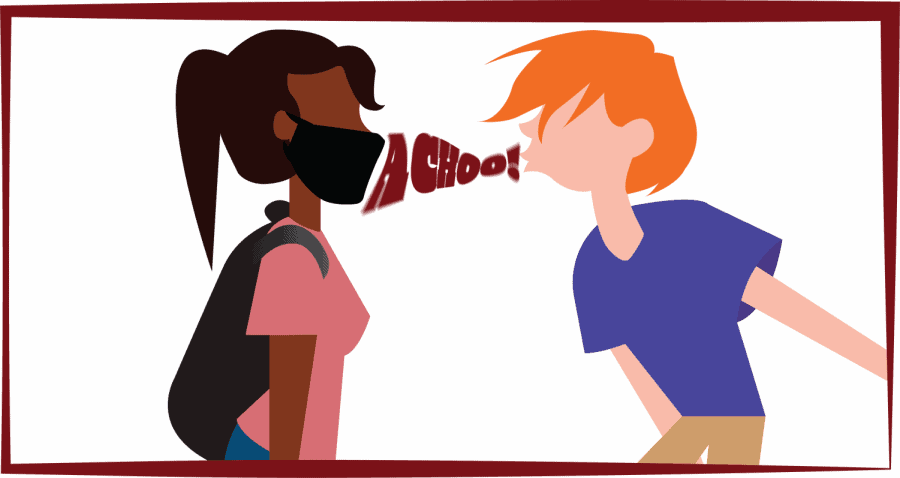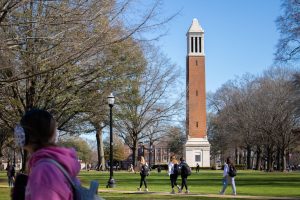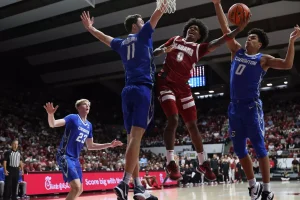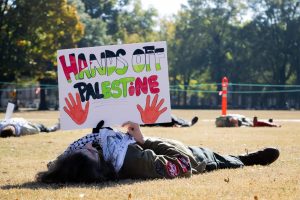Opinion | COVID isolation must be taken seriously
October 7, 2020
During my time in isolation at Burke West, many girls on my floor said they felt uninformed. Leah Rumptz, a freshman majoring in psychology who was isolated with me, said the University was very disorganized and “there were not really any rules” in isolation housing. I myself did not know any of the rules until I received an email from University Housing nine hours after already arriving at Burke.
The email contained details about the room I would be staying in, information about the supplies that would be provided for me and recommendations for what I should bring even though I had moved in hours earlier. The email also included regulations about wearing a mask at all times, except in my room, and staying at least six feet away from people outside my room.
Lack of communication notwithstanding, students who are sent to isolation housing should still be trying to keep others safe. Not knowing the rules about isolation housing doesn’t excuse students from making ill-advised decisions. Yet, many students I saw in isolation did not follow these rules.
Just because an email is long doesn’t mean students are allowed to ignore it. The email from housing administrators was extensive, but after reading it I understood that the same rules were in place inside isolation as on the rest of campus. It was vital that every student read the email fully, and it even said at the top in bold letters: “Please read the entire email/packet.” It seems that many did not do so. Even some who did read the email may have thought that since everyone was already sick, there was no reason to wear masks or social distance. But there was.
Each day, University workers would come to our floor to bring food, and University doctors would check on us. Many girls would be outside in the common area talking and sitting close together without masks. The delivery workers and doctors had to walk past them multiple times as they went through the hallways setting down bags of food and checking temperatures. Not wearing masks around perfectly healthy people is irresponsible and unkind. Infected students should not endanger people, especially not those providing essential services.
The email also said that “all students in quarantine or isolation housing are expected to stay in their apartment or room the vast majority of time.” However, students would exit the building to grab food directly from delivery drivers instead of having the drivers leave the food at the door. While these students did wear masks, people who are positive for COVID-19 should try to have the least contact possible with others. Making ethical choices is the students’ responsibility. The University cannot constantly babysit its students. If food workers, doctors and delivery drivers get sick, it is the students’ fault.
Burke West is not the only isolation housing with issues–the Highlands apartments have their own problems because they house both healthy and infected students. Sophomore Colleen Walsh, who majors in public health and is a resident of the Highlands apartments, said that she feels unsafe in her own laundry room because infected students share the same laundry room. Walsh added that many students do not wear masks while doing laundry. She also said that she has seen students breaking isolation housing and going outside to visit with friends through their car windows. When healthy residents of the Highlands told the University about these problems, the University told these students to do their laundry at Presidential Villages I and II.
Finally, three pieces of advice for the University:
Communicate better. Before isolation housing, I didn’t even know which dorms were for isolation. Evidently other people did not either because one day a student wandered all the way up to my floor of Burke West before he was informed that it was for isolation only. Imagine his shock as he realized he was exposed and likely going to test positive. Make the information about restricted areas on campus obvious to students.
Send out emails faster. If emails had been sent to every student right when they tested positive, they would have had more time to read all of the instructions. They would have been curious about the next steps to take. By the time students check into isolation housing they feel like their job is complete. They have settled in for the next 10 days.
Make sure students have one case manager who actually contacts them. Kenzie Bailey, a freshman studying athletic training who isolated at Bryce Lawn, said that she did not get a call from a case manager for multiple days after she arrived. For the rest of isolation, Bailey was shuffled between case managers, explaining her symptoms and situation to a new person every day. By the end of it, Bailey said she had at least four case managers.
While there are obvious issues in communication between the University and its students, this does not excuse students from behaving ignorantly. Students, take this seriously. Just because you are sick does not mean that you have to get everyone else sick too.










